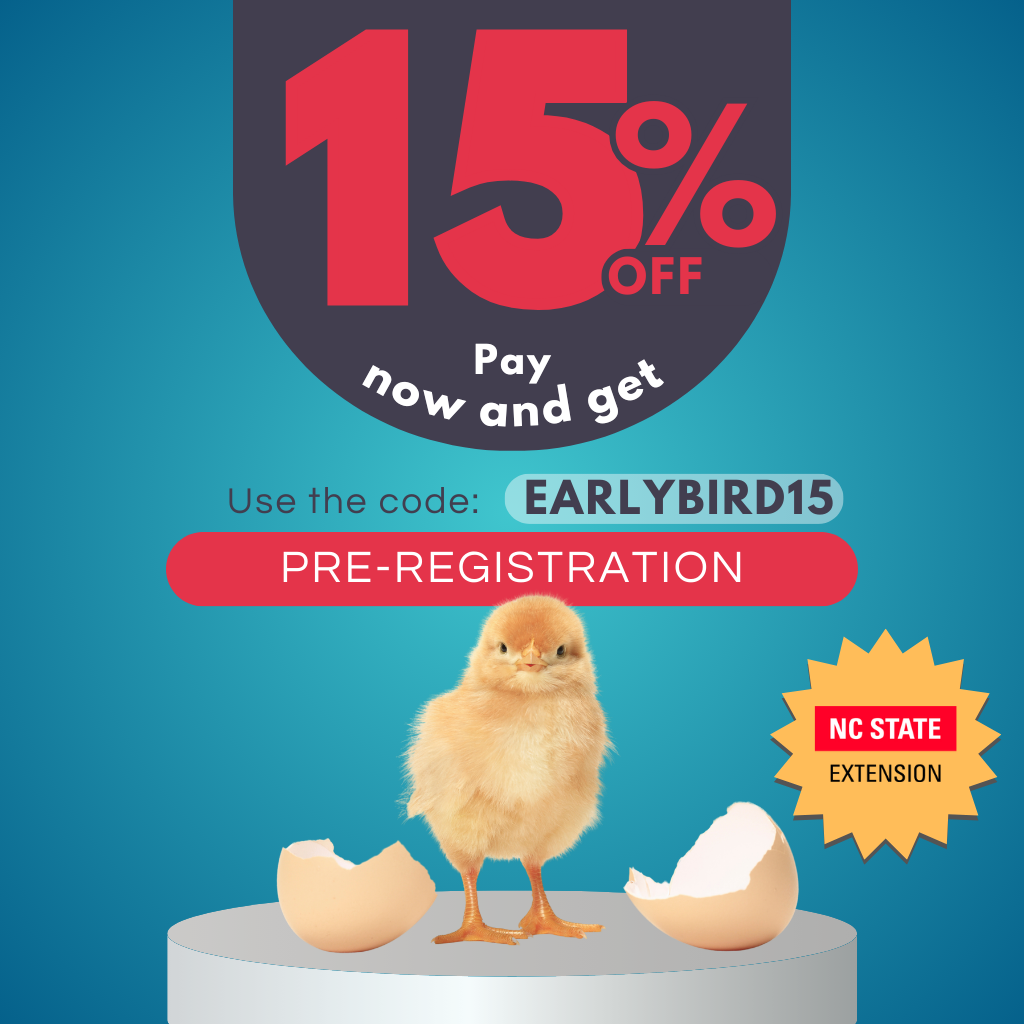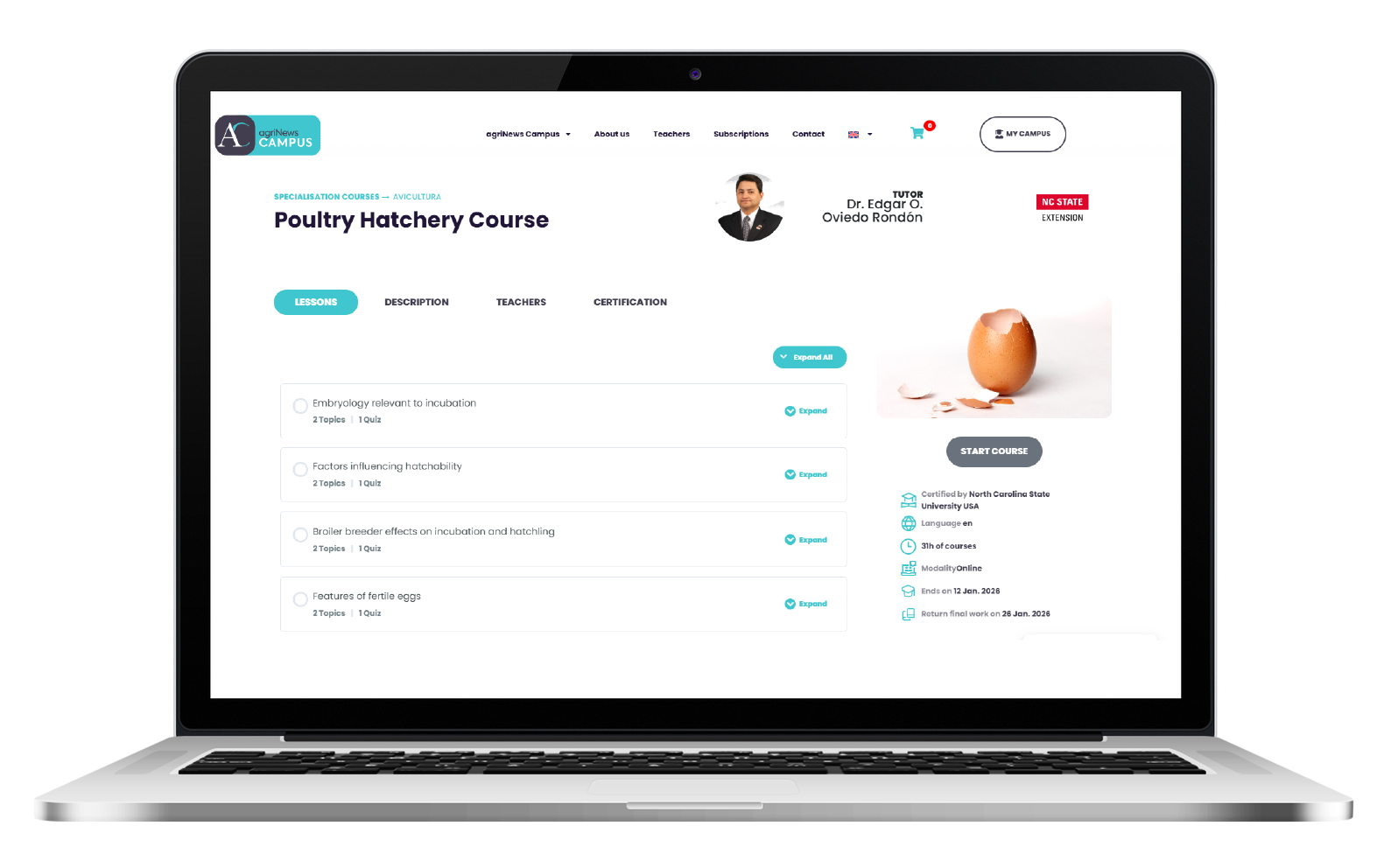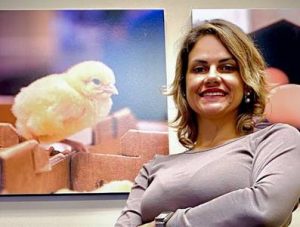Pre-register now and save 15% on the course
Early-bird price for a limited time.
Available on September 29, 2025
Boost your career with a 100% online course, tutored by Dr. Edgar Oviedo, Doctor of Poultry Science and Animal Nutrition, and official certification from NC State University.
Learn from experts and apply the knowledge directly to real-world production — with the option to complement your training through on-site training at North Carolina State University, for a unique hands-on experience with state-of-the-art facilities.
Early-bird price for a limited time.
2-4 Feb, 2026 · NC State University. Includes hotel, meals, transportation, course materials & lab resources, official certification and full online course access.


The Poultry Hatchery Course is a comprehensive program that brings together recognized international experts in incubation, and is academically endorsed by North Carolina State University (USA). In addition, the course can be extended with an on-site training at NC State.


This course provides a complete overview of incubator management through 31 online lessons, covering key topics in the industry.
Discover the key skills and knowledge you need to succeed in modern hatchery management.
Gain practical knowledge in incubation processes, egg handling, and environmental control.
Understand embryonic development and the specific needs of the species being incubated.
Master the use, maintenance, and optimization of incubators to improve hatch rates.
Learn to plan, manage, and evaluate hatchery projects from start to finish.
Promote ethical and sustainable hatchery practices focused on animal welfare and environmental impact.
Encourage innovation through research and the development of new hatchery techniques.
Connect with industry professionals and exchange knowledge and experiences.
Video lesson and downloadable PDF study material
To determine
merits and obtain certification
By North Carolina
State University
Questions to the tutor throughout the course
Enhace your experience with 3 days of hands-on training at North Carolina State University. Apply your knowledge, learn from experts, and earn your official certification.
February 2, 3 and 4, 2026 · Raleigh, USA
With the launch of the Poultry Hatchery Course by agriNews Campus, we are also opening pre-registrations for the On-Site Training at North Carolina State University, taking place from February 2 to 4, 2026.
Over three intensive days, you will learn directly from Dr. Edgar Oviedo, an international expert in poultry incubation, and work with the latest technologies and techniques, including In-Ovo vaccination, egg quality control, incubator management, and more. All in a top-tier professional environment, with fully practical sessions in English.
Important: Seats are limited, and pre-registration guarantees your spot in this exclusive experience.
Book now to secure your place at a special price and enjoy three days of practical learning that will boost your professional career.

To participate in the on-site training at North Carolina State University, enrollment in the Poultry Hatchery Course is required. On-site training is available only after completing the online course. Not sold separately at this ime.
On-site training is valued at $1600 USD. The combined price for the course + on-site training is $1950 USD (you save $120).
This fee includes:
Accommodation for 3 nights.
Internal transportation.
Coffee breaks, lunches, and dinners.
Full access to all activities and technical visits at NC State University.
If you require a visa to travel, we will provide you with an invitation letter and assist you through the process; all we need is a copy of your passport.
Here’s what makes our on-site training a unique opportunity.
Direct training with a world-leading expert in incubation.
Access to state-of-the-art facilities and equipment.
Networking with industry professionals.
Official certification to validate your experience.
Special launch discount: 15% off the course
If you are currently enrrolled in university, submit proof via form for a 50% discount code.
Corporate training? 5–9 people: 10% off | 10–19: 20% | 20+: 40%. Just add multiple courses to your cart — discount applies automatically.
This course provides a complete overview of incubator management through 31 online lessons, covering key topics in the industry.
Core embryology concepts that explain how embryos develop and respond to incubation conditions.
Key biological, environmental, and management factors that raise or lower hatchability rates.
How breeder age, nutrition, and egg quality affect incubation outcomes and chick quality.
Identifying external and internal egg features that predict fertility and strong embryo development.
Best practices for time, temperature, and humidity to preserve viability during egg storage.
Prewarming and conditioning protocols to reduce sweats and synchronize embryo development.
Setting parameters and daily management to match embryo needs throughout the incubation curve.
Fundamental requirements—temperature, humidity, oxygen, and CO₂—for healthy embryo growth.
Heat, mass, and gas exchange principles that govern incubator performance and embryo metabolism.
Optimal set procedures and tailored profiles for multi-stage and single-stage machines.
Why turning matters, recommended angles and frequencies, and troubleshooting malpositions.
How environmental stimuli influence embryo stress, orientation, and hatching success.
Managing late or early hatch and preventing chick dehydration during pull.
Techniques to narrow and shift the hatching window for uniform, vital chicks.
On-farm and inline hatching models: benefits, risks, and implementation tips.
Design and operation of airflow, pressure, and filtration for consistent climate control.
Planned maintenance routines that protect uptime, accuracy, and biosecurity.
Automation options from egg handling to data capture, and how to integrate them.
Reading break-out results to diagnose losses and optimize set, transfer, and incubation.
Using break-outs to validate site of injection, timing, and vaccine performance.
Overview of sexing-at-hatch and in-ovo sexing technologies and their feasibility.
Roadmap to deploy compliant alternatives, from equipment to workflow and training.
Principles of vaccine types, handling, and immune response in the hatchery context.
Device selection, calibration, and QA for precise in-ovo vaccination at scale.
Sources of contamination and practical control strategies across hatchery processes.
People, product, and perimeter controls to prevent pathogen entry and spread.
Early-life interventions that support microbiota development and intestinal integrity.
Practices that promote robust heart, lung, and leg development in chicks.
Welfare standards and humane handling from reception to pull and processing.
Transport preparation, crate conditions, and monitoring to maintain chick quality.
Building a data system that tracks KPIs and drives continuous improvement.


















Training has never been so easy and cost-effective! Subscribe on aviNews and unlock exclusive benefits.
Free access to more than 30 training capsules, 20% off in specialisation and advanced training courses.
In addition, with your subscription you will get:
© 2025 All Rights Reserved.
Para ofrecer las mejores experiencias, nosotros y nuestros socios utilizamos tecnologías como cookies para almacenar y/o acceder a la información del dispositivo. La aceptación de estas tecnologías nos permitirá a nosotros y a nuestros socios procesar datos personales como el comportamiento de navegación o identificaciones únicas (IDs) en este sitio y mostrar anuncios (no-) personalizados. No consentir o retirar el consentimiento, puede afectar negativamente a ciertas características y funciones.
Haz clic a continuación para aceptar lo anterior o realizar elecciones más detalladas. Tus elecciones se aplicarán solo en este sitio. Puedes cambiar tus ajustes en cualquier momento, incluso retirar tu consentimiento, utilizando los botones de la Política de cookies o haciendo clic en el icono de Privacidad situado en la parte inferior de la pantalla.
Para recibir el descuento del 50%, tienes que adjuntar un comprobante que certifique que eres estudiante